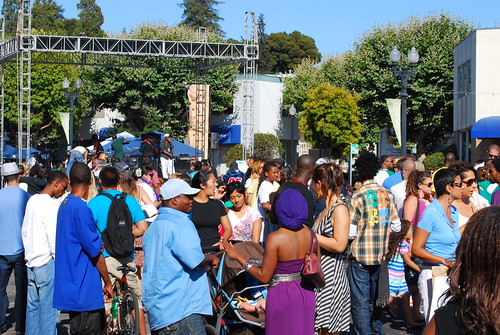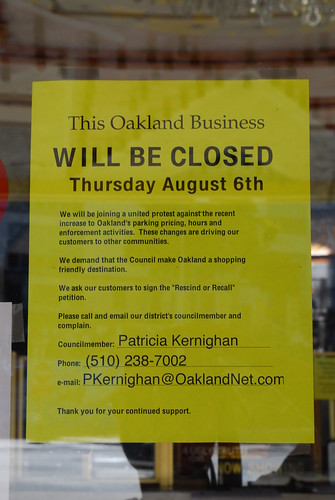They came on foot, on scooters and on skateboards. They came on scraper bikes and fixies and longtails. They came in strollers and buses and, yes, some of them came in cars. However they got there, a lot of people came out to enjoy the Lakefest held on Oakland’s Lakeshore Avenue on Saturday and Sunday:
I wouldn’t normally post anything about a street festival that was mostly indistinguishable from all the other street festivals which are held on summer weekends across the country (a closed street, booths with crafts or T-shirts or massages or information about local organizations, food vendors, outdoor tables and chairs in front of the local restaurants and cafes, music stages, inflatable bouncy houses and slides for children—you know the routine). What most interested me about this festival, however, was the counterpoint it provided to an event that had happened two days before and a block away.
The owner of the Grand Lake Theater, Allen Michaan, who is still fuming about the changes to parking meter rates and hours that I wrote about two weeks ago, held a meeting at the theater to discuss how businesses should respond to the increases. He proposes a local business closure all day on Thursday (Aug. 6th) in order to protest the new meter rules. He is also gathering signatures for a petition to recall City Councilmembers unless they rescind the higher rates and hours.
I couldn’t help but be struck by the difference between these two events. In one case, you had a festival that closed a busy street to car traffic and reduced the amount of parking in the neighborhood (because the many parking spots on Lakeshore Ave were rendered unavailable), yet people showed up in droves nonetheless, to hang out, to eat, to drink, to buy, to watch and to listen. In the other case, you had some local business owners who are raising so much hell about the “parking crisis” that they may end up losing even more customers.
How might their behavior cause them to lose customers? Three possible ways that I can see: First, residents who might have been willing to pay a bit more for parking are now basically being told by Michaan and a few other vocal merchants that it makes more economic sense to drive to a distant suburb to see a movie or visit a restaurant, because they will save a few dollars on parking (a dubious proposition, in my opinion, once you factor in the “value” of one’s time and the cost of fuel). I can’t help but wonder if any people have avoided coming to the area because they have seen Michaan or another business owner on TV talking about how the city of Oakland is going to “mug” and “extort” them if they try to park in this neighborhood. Second, organizing the business closure on Thursday will bring attention to the issue as they hope, but it will probably also piss off a lot of customers, who may well blame the business owners instead of the City Council if they come here to do some shopping and discover that their favorite stores have voluntarily closed for the day. This reminds me of a kid on a schoolyard who gets upset and takes his ball and goes home—he might succeed in punishing the other kids, but he also punishes himself. Third, turning this issue into World War III garners support from those who agree with them, but it also alienates the Oakland residents who disagree with them on the issue, or who at the very least think that their tactics are misguided and divisive (some commenters on local blogs are already saying they will start avoiding the businesses that are leading this campaign).
I won’t get too much into the merits of the debate, since I pretty much said everything I have to say in my earlier post. (I didn’t expect to write a second post about parking in as many weeks, especially since I don’t even own a car myself.) My personal opinion is that whatever pocketbook pain drivers experience now is literally small change compared to how expensive driving will soon become (the chief economist of the International Energy Agency is now warning that we will soon face oil shortages which will put our economy and way of life in even greater peril than they are now, a view of peak oil that was widely dismissed as a fringe theory just a few years ago). For better or worse, many people will have to start driving less because it will become so expensive, and it will probably be a difficult transition, but my general feeling is that the process will be much less painful in the long run if we start encouraging a change in behavior now instead of waiting for external circumstances to force the issue.
Given that likely future, combined with Oakland’s desperate need for more revenue in the present, I am inclined to support meter rates which will raise revenue, will reduce the amount of time drivers spend circling the block looking for a spot, and will encourage people to start walking, biking, and riding the bus for more of their routine trips. That said, if the effect on our neighborhood’s businesses is as dramatic as the merchants claim, then I am not necessarily opposed to changing the current meter rules. Maybe a compromise of $1.75 instead of the new $2 or the old $1.50? Maybe a return to $1.50, but keeping the extended hours? Maybe allowing cars to stay in spots for more than 2 hours at a time? Maybe different prices at peak times versus offpeak times? I don’t know, but whatever the right balance is, it should be guided by statistics and rational debate, not anecdotes, counterproductive media campaigns, and recall threats.
In other words, even if it’s true that local business has fallen by more than 30% due to the meter changes, and even if it’s true that the City Council should rescind or alter the new meter rules, I still don’t think that the combative reaction of Michaan and others is a productive approach to this particular issue. It has certainly succeeded in getting attention to the issue: the Tribune and the Chronicle have published several articles each on the subject, and the issue has been all over TV and the internet too. The crowds at Lakefest suggest to me, however, that angry business owners would have been better off brainstorming about creative ways to entice people to our neighborhood and building an even stronger sense of community, rather than banding together to accuse elected officials of “municipal muggings” and “extortion.” Do these people look like they are being mugged or extorted?
Positive efforts to draw people to the Grand Lake area wouldn’t preclude also making an effort to change the meter rules, but rants, threats, closing of businesses, and demonization of councilmembers don’t seem like constructive ways to encourage people to come to our neighborhood. (One also wonders where these local business owners were when it was being debated by the City Council several months ago—one blog post on the topic attracted 47 comments back in early June, so it’s not as if some people weren’t aware of the possible changes to come. Perhaps if these business owners were more engaged with the local decision-making process, we wouldn’t be in such a fiscal mess to begin with.)
This neighborhood has a lot going for it, and I think most people in Oakland appreciate the advantages that a neighborhood like Grand Lake has over a mall with free parking in Walnut Creek or Pleasant Hill (two cities cited by Michaan as being “successful” because they have free parking). How about a campaign to remind people of the unique character and businesses in this neighborhood, and more special events to draw people to the area, instead of a divisive feud with the City Council and a publicity campaign that may serve to drive away even more customers? Has Allen Michaan pointed out even once in his media interviews that, as the Grand Lake Theater’s own website advertises, there is a free city-owned parking lot across the street from his theater where people can park for 4 hours at a stretch, or that his theater is one of the few in the Bay Area where an adult ticket still costs less than $10, at least a buck less per ticket than most theaters in neighboring communities? That is the kind of information that he should be spreading far and wide in the media, in order to encourage people to come enjoy his beautiful theater and other nearby businesses, but instead he seems so absorbed in his own righteous indignation that he cannot do anything except focus on the negative and lash out at the City Council—actions that seem likely to exacerbate whatever ill effects the new meter rules are having on his business.





One Comment